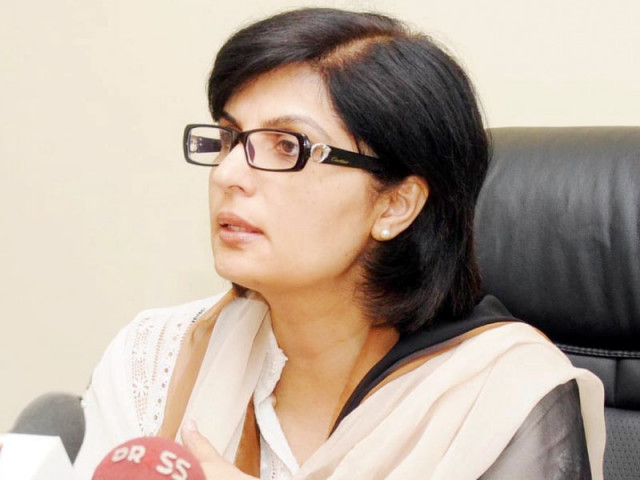Dr Sania for improving access to quality family planning
SAPM says accelerating efforts to ensure balanced population growth critical to achieving development goals

Dr Sania Nishtar. PHOTO: FILE
"The Ehsaas Programme realised the importance of provision of quality and affordable family planning services to its beneficiaries which signified the importance that the government attaches to the welfare of the under privileged and marginalised segments of the population," said the special assistant while addressing the launching ceremony of the innovative model for improving access to family planning services for marginalised women.
The event was well-attended by members of national and provincial assemblies, members from population welfare and health departments, federal and provincial ministries, public officials, UN agencies, health practitioners, donors, academia, civil society and the media.
The pilot intervention was an innovative model to extend access to family planning service to the Benazir Income Support Programme (BISP) beneficiaries and was being jointly implemented by the BISP, the Population Council and Punjab Population Innovation Fund (PPIF) in Rahim Yar Khan.
Dr Sania reiterated the government's vision of ensuring universal access to family planning for sustainable growth and poverty alleviation and hoped the evidence generated from this innovative pilot intervention would help in ensuring better health outcomes for the poorest women and their children.
Citing trends in reproductive health services for women of reproductive age in Pakistan, Population Council Country Director Dr Zeba Sathar said the highest unmet need for contraceptives in Pakistan was among the low-income women. "It is not just the lack of family planning services but also the lack of access to these services that hinders women to act on their fertility intentions," said Zeba. "Investing more in contraceptive care, especially within the public health system, will produce a much-needed boost in meeting both family planning and maternal health goal and will support the 2018 Council of Common Interests recommendations on family planning."
On the occasion, PPIF Chairman Dr Ijaz Nabi said, "The government of Punjab has established PPIF as a technical hub to the pilot initiative, scalable and sustainable family planning interventions such as this one in Rahim Yar Khan district."
He said the PPIF with independent board of directors and a flexible programmatic and organisational structure specialised in designing and piloting interventions that could supplement public sector programming for improving family planning information and services.
Explaining the design of the pilot intervention, Population Council Director Programmes Dr Ali Mir said the intervention would mitigate cost and information-related barriers by financing the uptake of family planning services for 20,000 BISP beneficiaries - married women of reproductive age.
It would also create community-based information channels for an additional 60,000 BISP beneficiaries through BISP Beneficiaries Committees, BISP Mother Ambassadors and Lady Health Workers, he said.
He said, "The intervention will have a digitised voucher management system based on a mobile application for verification and disbursement of funds to beneficiaries and service providers."
The vouchers would be used either at the government facilities where family planning services were already being provided for free, or the private sector providers, he added.
PPIF Chief Executive Officer Jawad Ahmed Qureshi said the pilot model would facilitate low-income married women of reproductive age in Rahim Yar Khan through a voucher scheme to avail free family planning services.
He said transportation cost would also be reimbursed to these women, thereby eliminating the financial barriers for poor women in uptake of family planning services.
Ahmed hoped that the successful implementation of this pilot would pave the way for scaling up this model throughout Punjab.
UNFPA Country Representative to Pakistan Lina Mousa reaffirmed UNFPA's support to work with the government of Pakistan in ensuring that high-quality services and information were made accessible to all the couples to decide the number and spacing between their children.
She also highlighted the greater need for empowering women by providing them better opportunities at health and education.
UNFPA was supporting the design and evaluation of this pilot model through the Population Council.
Punjab Minister for Population Welfare Colonel (retd) Hashim Dogar stressed that the Population Welfare Department laid great emphasis on providing quality family planning services through its service delivery network and was striving hard to make reproductive health and family planning services available to every household in Punjab.
He mentioned that the government had allocated more funds for population welfare in the budget this year.
With additional input from Agencies



















COMMENTS
Comments are moderated and generally will be posted if they are on-topic and not abusive.
For more information, please see our Comments FAQ